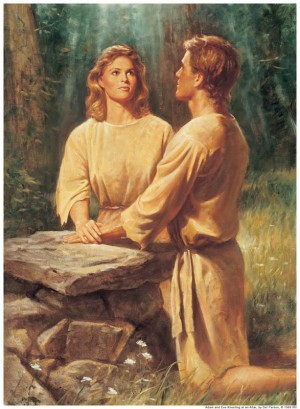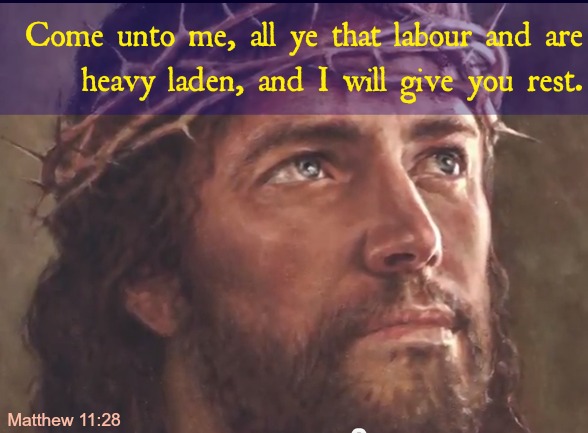The Fall of Adam and Eve
The Atonement cannot be properly understood without an understanding of the Fall. The two go hand in hand. The Fall refers to the partaking of the forbidden fruit by Adam and Eve in the garden of Eden and their being cast out of the garden into mortal life (genesis 3). It can be said that they “fell forward.” It was a necessary and planned step in the Father’s plan of salvation for us. It brought with it physical death and also brought spiritual death (being cut off from the direct physical presence of god). The Atone- ment of Jesus Christ overcomes physical death for all, through the universal resurrection of the dead (1 Corinthians 15:22). It also makes it possible for those who will to repent and overcome spiritual death and thus return to the physical presence of the Father, to live with Him forever in celestial glory.
 While other churches teach that the Fall was a terrible tragedy and brought unfortunate misery upon all mankind, the true gospel teaches that it was good and is a great blessing for all of us. While many churches criticize and even vilify Adam and Eve, especially Eve, for partaking of the forbidden fruit, we honor them and hold them in highest esteem for taking this vital step which opened the door for all of us to come to earth. The fact that the Fall was good and was part of the Father’s plan is clearly taught by Lehi in the Book of Mormon as he gives a brief and concentrated overview of the Fall and Atonement. As you read the verses quoted next, note the important points emphasized by the Savior through His prophet, Lehi, including:
While other churches teach that the Fall was a terrible tragedy and brought unfortunate misery upon all mankind, the true gospel teaches that it was good and is a great blessing for all of us. While many churches criticize and even vilify Adam and Eve, especially Eve, for partaking of the forbidden fruit, we honor them and hold them in highest esteem for taking this vital step which opened the door for all of us to come to earth. The fact that the Fall was good and was part of the Father’s plan is clearly taught by Lehi in the Book of Mormon as he gives a brief and concentrated overview of the Fall and Atonement. As you read the verses quoted next, note the important points emphasized by the Savior through His prophet, Lehi, including:
• Work is a part of the plan.
19 And after Adam and Eve had partaken of the forbidden fruit they were driven out of the garden of Eden, to till the earth. 20 And they have brought forth children; yea, even the family of all the earth. (2 Nephi 2:19–20)
• Repentance and resulting personal progress are part of the plan. This life is a test, a “probation,” to see how we act away from home. The Fall without the Atonement would lead to our being “lost.”
21 And the days of the children of men were prolonged, according to the will of god, that they might repent while in the flesh; wherefore, their state became a state of probation, and their time was lengthened, according to the commandments which the Lord god gave unto the children of men. For he gave commandment that all men must repent; for he showed unto all men that they were lost, because of the transgression of their parents. (2 Nephi 2:21)
• Without the Fall, there would have been no progress.
22 And now, behold, if Adam had not transgressed he would not have fallen, but he would have remained in the garden of Eden. And all things which were created must have remained in the same state in which they were after they were created; and they must have remained forever, and had no end. (2 Nephi 2:22)
• Without the Fall, we would not be here. Without the Fall, there would have been no contrasts, no joy, no misery, no good, no sin. (2 Nephi 2:23)
23 And they would have had no children; wherefore they would have remained in a state of innocence, having no joy, for they knew no misery; doing no good, for they knew no sin.
• The Fall was according to God’s plan, “done in the wisdom of him who knoweth all things.”
24 But behold, all things have been done in the wisdom of him who knoweth all things. (2 Nephi 2:24)
• The Fall was good, designed to bring joy to us.
25 Adam fell that men might be; and men are, that they might have joy. (2 Nephi 2:25)
• The Atonement redeems us from the Fall. The Fall and the Atonement work together to give us the opportunity to progress. The Fall both enables and also preserves individual agency. Satan wants everyone to be miserable like he is.
26 And the Messiah cometh in the fulness of time, that he may redeem the children of men from the fall. And because that they are redeemed from the fall they have become free forever, knowing good from evil; to act for themselves and not to be acted upon, save it be by the punishment of the law at the great and last day, according to the commandments which God hath given. 27 Wherefore, men are free according to the flesh; and all things are given them which are expedient unto man. And they are free to choose liberty and eternal life, through the great Mediator of all men, or to choose captivity and death, according to the captivity and power of the devil; for he seeketh that all men might be miserable like unto himself. (2 Nephi 2:26–27)
Others Have Likewise Praised Adam and Eve
We are not the first on earth to understand that the Fall was good and that the Fall and Atonement go hand in hand. Consequently, we are not the first to praise and honor our original ancestors. Three years before Adam died, the righteous posterity of Adam and Eve met in a large gathering at Adam-ondi-Ahman (about seventy miles northeast of present-day Independence, Missouri) to receive a final blessing from Adam and to praise him (no doubt Eve was included in that praise). They knew him as their grand ancestor and also as Michael, the archangel, who helped create the earth.
53 Three years previous to the death of Adam, he called Seth, Enos, Cainan, Mahalaleel, Jared, Enoch, and Methuselah, who were all high priests [Adam had ordained all of them to the Melchizedek Priesthood—see D&C 107:42–50], with the residue of his posterity who were righteous, into the valley of Adam-ondi-Ahman, and there bestowed upon them his last blessing.
54 And the Lord appeared unto them, and they rose up and blessed Adam, and called him Michael, the prince, the archangel.
55 And the Lord [the Savior] administered comfort unto Adam, and said unto him: I have set thee to be at the head; a multitude of nations shall come of thee, and thou art a prince over them forever.
56 And Adam stood up in the midst of the congregation; and, notwithstanding he was bowed down with age [according to Bible chronology, he was 927 years old at this point], being full of the Holy ghost, predicted whatsoever should befall his posterity unto the latest generation. (D&C 107:53–56)
continued…. What do Latter-day Saints (Mormons) Believe About the Fall (Part II of III)
Learn more about the fall of Adam and Eve at the official site of The Church of Jesus Christ of Latter-day Saints (inadvertently called by friends of other faiths as the “Mormon Church”).
Source:
D. Ridges, The Fall, (Springville, Utah: Cedar Fort, Inc., 2010), 25-37.



